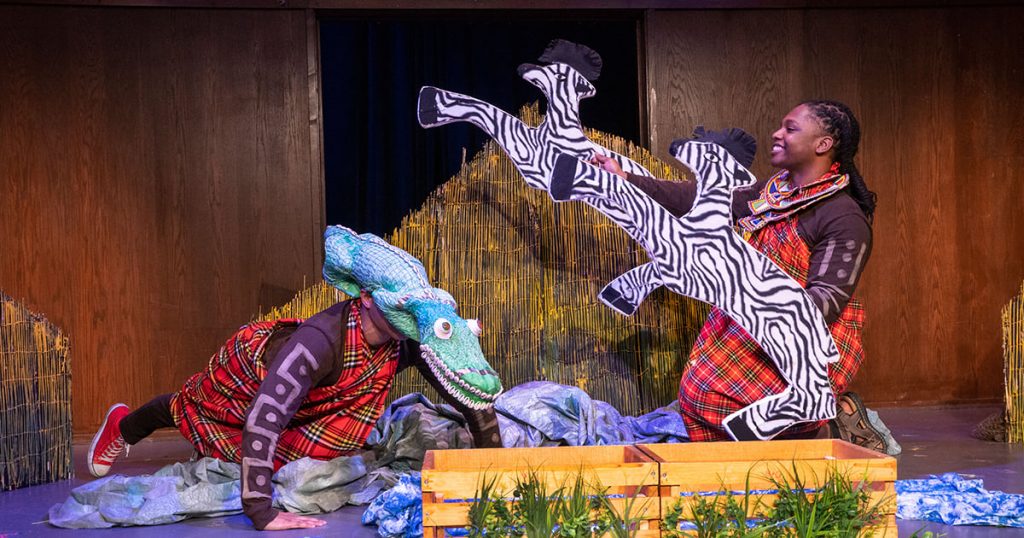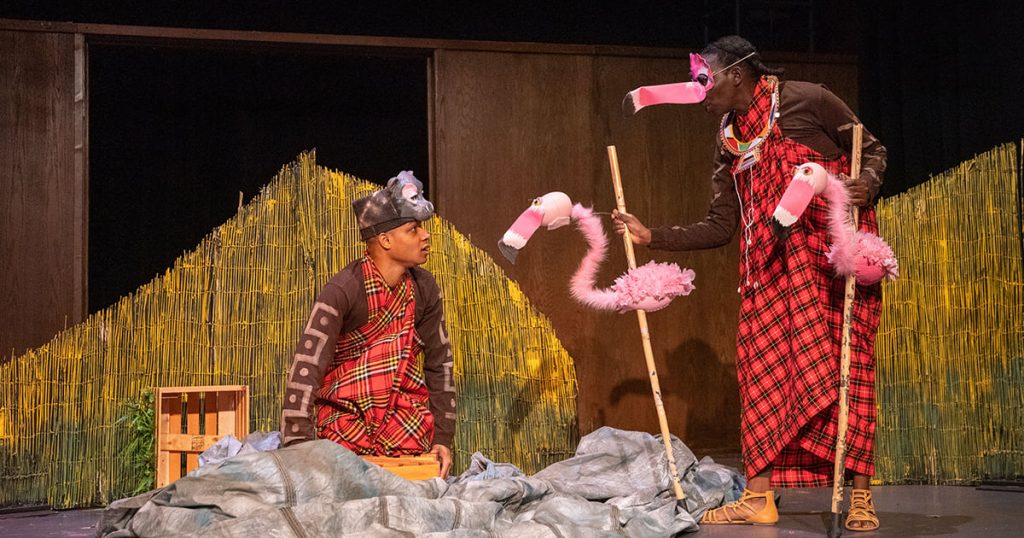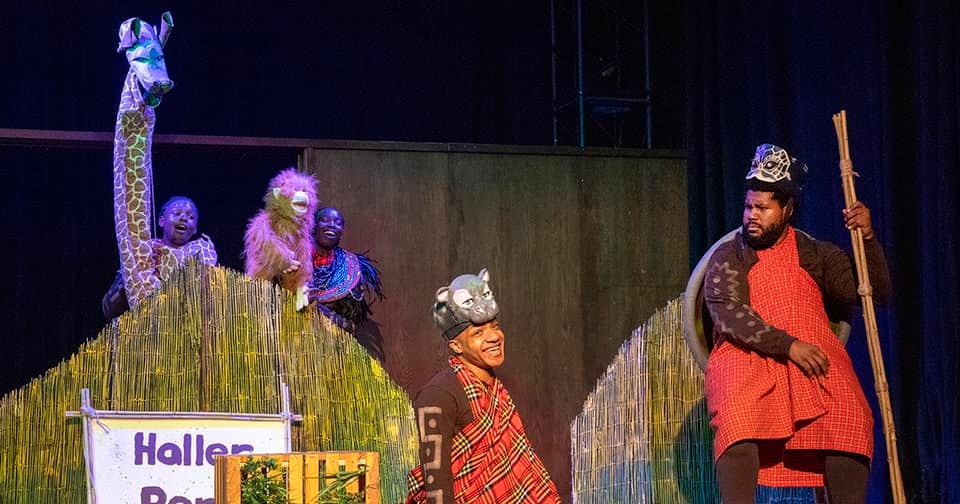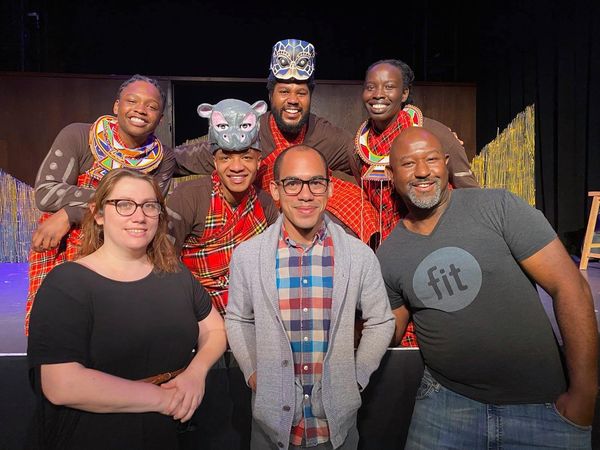Joan Cushing (1947-2024)
Joan Cushing, singing satirist of ‘Mrs. Foggybottom’ revue, dies at 77
She skewered Washington grandees in a long-running cabaret-style show before becoming a nationally known creator of musicals for children.
By Emily Langer June 25, 2024 for the Washington Post

Joan Cushing, a fixture of the Washington theatrical scene who entertained audiences of all ages, first as the plume-hatted Mrs. Foggybottom in a long-running political satire revue and later as a nationally known creator of plays for children, died May 21 at a care facility in Columbia, Md. She was 77.
Her family confirmed her death and said she had Parkinson’s disease.
Ms. Cushing, a onetime schoolteacher, began her performing career at Washington-area piano bars and burst to fame as Mrs. Foggybottom, a character she conjured up to amuse bar patrons in between show tunes and standards.
Named for the neighborhood of Washington that is home to the State Department, the Watergate complex and George Washington University, Mrs. Foggybottom was a martini-sipping dowager — one of “those ladies who lunch,” as Ms. Cushing described her.
In the persona of her alter ego, Ms. Cushing skewered the city’s grandees in a cabaret-style show, “Mrs. Foggybottom and Friends,” that opened in 1986 at the New Playwrights’ Theatre, played for nearly a decade at the Omni Shoreham Hotel, appeared at the Hexagon charity revue — where Ms. Cushing was a regular — and also went on the road.
“Political satire has an essential role in this town,” Ms. Cushing told the Washington Times in 1995. “People do take themselves too seriously.”
She joined several acts in Washington, among them the Capitol Steps and Gross National Product, that delivered sendups of politicos, wonks, VIPs and wannabe VIPs in a mixture of stand-up and song. Mark Russell, perhaps Washington’s best known musical parodist, once declared of Ms. Cushing that “she has more dignity than I do.”

Mrs. Foggybottom’s heyday coincided with the presidency of Ronald Reagan, whom she lampooned as “Rip Van Reagan, the first president to complete his memoirs even before leaving office — both pages.”
She mocked Reagan’s executive order requiring drug testing of federal workers in the “Water Music Minuet,” in which she sang of urinalysis as “trickle-down theory working at last.”
Her number “The Deficit Shuffle” incongruously had U.S. Sens. Phil Gramm (R-Tex.), Warren B. Rudman (R-N.H.) and Ernest F. “Fritz” Hollings (D-S.C.), authors of the Gramm-Rudman-Hollings balanced budget act of 1985, singing in rap.
During the George H.W. Bush administration, Ms. Cushing ribbed Vice President Dan Quayle, who was widely ridiculed for misspelling the word “potato.”
“Can you imagine if Dan Quayle were our commander in chief during the Panama invasion,” Mrs. Foggybottom quipped, “and our troops invaded Pomona, California?”
Mrs. Foggybottom mounted her own campaign for the presidency on the Cocktail Party ticket. She pledged, if elected, to ensure that every American could correctly spell “hors d’oeuvres.”
In addition to her stage performances, Ms. Cushing penned a satirical column that appeared in the Capitol Hill publication Roll Call and in the Georgetowner newspaper.
She had never written for children, however, when Imagination Stage, then located at the old White Flint Mall in suburban Montgomery County, Md., commissioned her in 2001 to write a musical based on the book “Miss Nelson Is Missing!” (1977) by Harry Allard with illustrations by James Marshall.
Kathryn Chase Bryer, the director of theater at Imagination Stage, said that she and her colleagues admired the cleverness of Ms. Cushing’s lyrics for Mrs. Foggybottom and did not see her lack of experience in theater for young people as a limitation.
Ms. Cushing was a gifted storyteller, Bryer said, and the principles of storytelling are the same, whether the audience is made up of grown-ups or children. “When you’re a child you care about things passionately,” Bryer said. “They just happen to be different things than what you care about when you’re an adult.”
“Miss Nelson Is Missing!” — about a schoolteacher, her class and the dreaded substitute Viola Swamp — became one of the most popular musicals for children. (It is currently playing again at Imagination Stage, now located in Bethesda, Md.)

From that point on, Ms. Cushing devoted her career in large part to young audiences. Her works became mainstays of Imagination Stage, the Adventure Theatre at Glen Echo in Washington and other children’s theaters around the country.
She followed “Miss Nelson Is Missing!” with “Miss Nelson Has a Field Day” and brought author Barbara Park’s popular character Junie B. Jones to stage in “Junie B. Jones and a Little Monkey Business.”
Ms. Cushing’s play “Petite Rouge,” based on a book by Mike Artell with illustrations by Jim Harris, is a Cajun retelling of the Little Red Riding Hood fairy tale, and “Ella’s Big Chance,” adapted from a book by Shirley Hughes, sets Cinderella in the Jazz Age.
Ms. Cushing’s play “Grace for President,” based on a book by Kelly DiPucchio and LeUyen Pham, centers on an African American girl who runs for president in a mock election at her school. It remains one of Ms. Cushing’s most popular works, according to her agent, Susan Gurman.
Joan Marie Cushing was born in Evanston, Ill., on Aug. 18, 1946. Her father was a physicist, and her mother was a Montessori teacher who raised Ms. Cushing and her seven siblings.
Ms. Cushing grew up in Winnetka, Ill., outside Chicago, before moving at age 13 to Kensington, Md., a suburb of Washington. She had years of classical music training and graduated from the Academy of the Holy Cross, an all-girls Catholic school in Kensington, in 1964. She was a 1970 elementary education graduate of the University of Maryland.
Ms. Cushing taught elementary school while moonlighting as a piano player at Washington-area bars and restaurants, including Mr. Smith’s in Georgetown and the Fire Escape Lounge in Alexandria, Va., where Mrs. Foggybottom made her debut. “One day,” Ms. Cushing told The Washington Post, “I decided that playing piano was more fun” than teaching.
Her husband, Paul Buchbinder, died in 2010 after 25 years of marriage. Survivors include a son, Ben Buchbinder of New Orleans; a stepson, Chris Buchbinder of Mill Valley, Calif.; a son from a previous relationship, Patrick Lavelle of Lafitte, La.; a sister; six brothers; and four grandchildren.
Ms. Cushing was a longtime District resident and belonged to Holy Trinity Catholic Church in Georgetown.
She wrote several plays for adults, including “Flush!,” set in a restroom at a venue that is hosting both a wedding and a funeral; “Tussaud,” about the French wax sculptor Marie Tussaud; and “Breast in Show,” a musical about the experience of breast cancer.
But her works for young people were perhaps the most enduring, if only because the collective audience of children is continually renewed.
“When I write, I don’t write for kids,” Ms. Cushing told the Nashville Tennessean. “I just write. I know in my head that a kid audience will see it, but I try not to think about that. When I was growing up, we didn’t go to children’s musicals. We just went to Broadway. And no, we didn’t get everything, but we still had a great time. Sometimes, with children’s musicals, there can be a very simple story on the surface, but another level underneath.”

Imagination Stage to Present MISS NELSON IS MISSING! This Summer
Performances begin June 29.
By: Chloe Rabinowitz May. 15, 2024

Imagination Stage, the metro DC region’s largest professional theatre for young audiences and leader in positive youth development through the arts, will conclude its ‘Greatest Hits’ season with composer/writer/lyricist Joan Cushing’s Miss Nelson is Missing!, running June 20 – August 10, 2024, with weekday and weekend matinee performances. The musical, commissioned by Imagination Stage and originally produced in 2001, is directed by Janet Stanford.
The show is based on the beloved book by Harry Allard and James Marshall about the children of Horace B. Smedley Elementary School, room 207, who are not just badly behaved–they’re the “worst kids of all!” No matter what their sweet and caring teacher Miss Nelson tries, they simply won’t listen. Fed up with their behavior, Miss Nelson leaves her class in the hands of dreaded substitute teacher Miss Viola Swamp, infamous for bringing “woe to those who misbehave.” Terrified of “the Swamp,” the kids must work together and with Detective McSmogg to find their kindhearted teacher and win her back. The show is best for ages 4 and up.
Tuneful and hilarious, this Imagination Stage original has been a hit at theatres from coast to coast. In a 2008 Washington Post piece about the 100th production of Miss Nelson Is Missing!, Celia Wren wrote, “…it’s easy to see why the show has so many notches on its belt. It brims with conflict and drama, without being scary; it balances the perspectives of its zany adult and obstreperous child characters; and it revels in sly comic touches.”
Well known for her political satirical revue “Miss Foggybottom and Friends,” Cushing had not written for children before Stanford convinced her to write Miss Nelson is Missing! That first show was the start of something major: Cushing went on to write five more shows for Imagination Stage and several for other theatres. Along the way, she collected critical and popular acclaim, awards, and over 400 total productions.
Director Stanford, who is stepping down from her full time role at Imagination Stage on May 31, says “I love the journey the kids take from being self-indulgent and ill-behaved to recognizing their responsibility in creating a really big problem that they now need to solve.” Stanford will focus on physicalizing this normally internalized journey: “The kids will be pushing the boundaries of their known world, literally expanding their horizons, as they take to their roller skates and scooters to search for Miss Nelson.”
Stanford is excited to work with her talented cast, and is especially delighted that the accomplished Emily Kester gets a chance to shine in the title role; “Emily has been in several shows at Imagination Stage, and if there is anyone who can be scary and not-scary at the same time, it is Emily.” Kester just completed the run of At the Wedding at Studio Theatre.
Joining Stanford on the creative team are Tony Thomas (Choreographer), Debbie Jacobson (Music Director/Orchestration), Milagros Ponce de Leon (Scenic Designer), Max Doolittle (Lighting Designer), Jeannette Christensen (Costume Designer), Andrea “Dre” Moore (Props Designer), and Kevin Alexander (Sound Designer).
The acting ensemble includes Emily Kester as Miss Nelson, Jimmy Mavrikes as Pop Hanson/Mr. Blandsworth/Detective McSmogg, and Tyler Dobies, Justine “Icy” Moral, Graciela Rey, and Theodore Sapp as Miss Nelson’s students. Samantha Leahan is Stage Manager.
The ‘Greatest Hits’ series has celebrated the twentieth anniversary of Imagination Stage’s beautiful building in downtown Bethesda. Imagination Stage will announce its 2024-2025 season in June.
Weekday and weekend matinees for the general public are Tuesdays through Saturdays and some Sundays, including some special performances (listed below). The full calendar is here. Tickets are $12 and up and may be purchased online at imaginationstage.org, in person at Imagination Stage’s box office, or via phone at 301-280-1660. Group rates are available for parties of 10+.
Special Performances
Meet the Actors offers a chance to say hello and pose for pictures with members of the cast following these performances:
June 29 at 10:00
July 6 at 1:00
July 13 at 4:00, this is also Pride Day
July 20 at 4:00
July 27 at 4:00
August 3 at 4:00
August 10 at 1:00
Industry and Educators Night is a pay-what-you-will event for theatre makers and education professionals to attend with or without children on Monday, July 22 at 7:00
Early Adapters
A TYA radio play-turned-musical opens this weekend at the Kennedy Center, with accessibility and community at the forefront.
By Alexandra Pierson for AMERICAN THEATRE
When, during the COVID-19 lockdown, Tim J. Lord was commissioned by the Kennedy Center to write a radio play for young audiences based on the theme of “uncommon heroes,” he drew inspiration from his Midwestern roots and teenage memories of the Great Flood of 1993. The resulting play, Through the Sunken Lands, was a modern-day epistolary tale set in the aftermath of a devastating flood that has decimated a small town on the banks of the Mississippi and left Artemis, a teenaged wheelchair user with cerebral palsy, stranded in the local library. She survives—and fights off the plans of a team of developers to erase the town’s history—with the help of a talking heron, a bighead carp, and her Aunt Maggie across the water.
Now, Lord’s radio play has taken on three dimensions and added songs. An in-person musical version, with a score by Avi Amon and direction by Cara Phipps, plays at the Kennedy Center March 2-17.
The creative team partnered with DPD Casting to recruit actors who are wheelchair users to perform (Meredith Aleigha Wells) and understudy (Molly Nilsen) the role of Artemis, and set designer Andrew Cohen has created a set that the actors can move through freely. Thus, in both form and content, Through the Sunken Lands models the path for a new normal where everyone’s access needs are minded and met. American Theatre spoke with the playwright, composer, and director over Zoom last fall, while the musical was still in development.

ALEXANDRA PIERSON: Where did these characters and this story come from?
TIM J. LORD: It was originally commissioned by the Kennedy Center’s Theater for Young Audiences. Their pivot during Covid was to commission writers to do these short radio plays for young audiences. I don’t remember what the exact prompt was, but it was basically uncommon heroes or superheroes you haven’t seen before.
I’m originally from the Midwest. I’m from St. Louis originally and grew up along the Mississippi River. A lot of my plays are set in the Midwest, so I just sort of figured I should run with that—why fight it now? Artemis is a character who’s been coming into my brain in a lot of different ways recently. I had this image of this young girl who’s a wheelchair user and goes on some kind of journey, so I thought this seemed like a good time to explore that.
It began with her and this idea of a flood. I experienced the 1993 flooding of the Missouri and Mississippi Rivers when I was a teenager and that sort of stuck in my imagination. As soon as I knew I was writing a play for young audiences, I was like, there has to be a talking animal, because I don’t get to do that all the time and it’s a lot of fun to play with. I’ve had this thing for herons in the last five years, because they’re just really cool birds. So Nicodemus as a great blue heron was sort of an obvious way to go.

After its initial incarnation, how did you adapt it into a musical for the stage?
LORD: This all began with the radio play, obviously, but then I came back and pitched it to the Kennedy Center and said, “I really love the world that I’ve created here and these characters, and I feel like there’s more to explore. I have an idea for how we can take it from just purely an audio experience into live action…and maybe it’s a musical.” And basically, they said, “Yeah, that sounds great. Do you have any composers in mind?” I thought about it, and I was like, “There’s this guy Avi Amon who’s amazing.” We’ve worked together a few times on individual songs here and there. So I reached out to Avi and he said that he was game.
Avi and Cara, what made you say yes to this project?
AVI AMON: Honestly, just because of the relationship Tim and I had from the 52nd Street Project, it was an easy yes. We have, thankfully, a very smooth collaborative shorthand. It could have been a really bad show and I probably would have said yes, but thankfully, it’s not. I think there’s an immense amount of trust in the way that Tim writes and in the space that he leaves open for other people to kind of do their thing. It’s never just a blank check to go off and do you, but there is space for you to do you, and most likely, it’s gonna be in the ballpark.
CARA PHIPPS: Frankly, when I got the email about it, I thought it was a joke. I thought it was spam. I opened it up and I was getting ready to toss it, and then I looked and I saw the Kennedy Center, and I was like, wait a minute. Then I saw Tim’s name and I texted him immediately. Similar to Avi, I was like, “Is this for real?” He’s like, “This is for real.”
Tim and I met back in the beginning of 2018 when he was a Jerome Fellow at the Playwrights’ Center. When we were both in the Twin Cities, we’d go out for beers, and I’d lament about my life in the theatre, like, “I’m just gonna quit and get a corporate job.” And Tim would be like, “Nope, you’re not allowed to, at least not until we get to work together.” Now it’s all come to fruition, here we are, and I’m grateful to be a part of this process.
Can you tell me about your songwriting process?
LORD: We had a few meetings over Zoom, but I think all of our songwriting has really been in person. For the first song or two, I wrote some lyrics and sent them to Avi and he came back with a few musical sketches. But our most productive songwriting has been in person and that for me has been a really inspiring and exciting way to work.
AMON: Every writer says that there’s nothing like being in a room together. You can’t fake that kind of synchronicity and collaborative energy. During these moments when we can be together, stuff blossoms in ways that I could never have imagined. You don’t get a breakthrough on your own in your apartment. You get a breakthrough when you’re in a room wrestling with something, while you’ve taken your shoes off and are walking around and the other person is doing something else. And you’re like, “Wait, that’s it!”

How would you describe the musical’s sound?
AMON: The sound is rooted in Americana. We’re trying to draw inspiration from direct sources as opposed to musical theatre references of those sources. So I’m listening to a lot of American roots music here, a lot of rock music, and a lot of pop as well. One thing that I know is that there’s going to be guitar.
The radio play deals with some heavy political topics: climate change, bureaucracy, gentrification. How do you make those themes accessible for young audiences?
LORD: All of my plays are really political, and actually, the plays that I write for young audiences are probably the most political. I met Avi working at the 52nd Street Project in New York City. We first worked together writing these short plays that kids would act in with an adult partner, and each of them had to have a song in them. Avi can also affirm what I learned from the kids’ own writing. When they would write their plays, you wouldn’t know they were written by 9- and 10-year-olds. They were just awesome plays that could be written by anybody of any age. I’ve learned from doing a lot of these that as long as you’ve got a good story and it moves, you can write something incredibly political and the kids will go with it, run with it, and just have a blast with it.
AMON: It’s what they’re thinking about from a very emotional place, because this stuff affects them. Maybe they don’t have 30 years of science class yet, but they know that the world that they’re entering into and becoming young adults in is not the one that their parents grew up in. And that can feel kind of ungrounding, right? If you can see that the main adults in your life are questioning things going on, of course that influences how you engage with the world. So creating a space where they can see that reflected onstage, and also creating language for them to articulate some of the things that perhaps they are not able to, I think is incredibly powerful.
PHIPPS: This is my first time doing TYA, and I’m really pumped about it, because I think that audience is a very truth-telling audience. They will call you on stuff, they will hold you accountable, and I’m here for it. I think as artists it’s really important for us to be held accountable for what we’re presenting, but then also to speak to this audience as they’re growing up in this time. We’re here to be in conversation with them and offer them language to put to the things that they’re feeling, or wanting, or giving them the chance to see something and say, “I need to go home and talk about this.”
Did you always envision the character of Artemis to be a wheelchair user with cerebral palsy?
LORD: She was envisioned as being a character with a disability from the beginning. Something I talk about with my own experience of disability is that, in some ways, we are the most ready for a post-apocalyptic world because we have to live with adaptation every day of our lives. It is something that we’ve always had to deal with.
In her situation, she’s stuck in the library, there’s no electricity, there’s no refrigerator or pantry to get food from. She’s got to learn. She’s got to make sure she has fish, and somewhere to keep the fish. The thing that I learned as I really delved into her world is the fact that she is on her own and there is no outside judgment means she can actually shape the world into the way she wants it to be. The world of the library that she’s in is very much her world.
It’s not the kind of story that we tend to see. Typically speaking, the disability stories that get told on our stages, if they get told at all, are about, “Oh, the poor disabled person,” or how they have to overcome their disability. She’s not trying to overcome anything. This is never changing for her. This is what her reality will be for her entire life. So it’s this idea that disability actually becomes an advantage. We tend to think of disability as a disadvantage, or as making a person lesser. For so many people I know from the disability community, it’s not that way at all. I’ve had conversations with several friends about, if they could not be disabled, would they choose that? And usually, the answer is kind of, like, if there were a way that they could retain the experience of having been disabled, then sure, because the world is sometimes easier that way. For my particular disability, I would never want to not have that experience—to just give that up.
That was very much on my mind when I was thinking about this world. There’s something about her and her experiences thus far that actually allow her to thrive in this world. Obviously, there’s difficulty, there are challenges, but ultimately, because she’s a strong human being, she’s able to thrive through it.

Are you auditioning disabled actors for the role?
PHIPPS: We are working with this fantastic company called DPD Casting. Our casting call is on their social media. We are specifically looking for actors who use wheelchairs. That’s something that’s been very important to us from the beginning with Tim’s story and this character. It is incredibly important to the storytelling, and also in terms of giving actors work. Those people are out there, and we’re in the midst of casting them.
We’re very mindful in terms of how we’re creating the world and making sure that the design of the set and everything is as it should be for allowing this actor to move through the set. Everyone’s going to be able to move through this set easily. We’re also very invested in actively working with that person’s needs and having it be a true collaboration.
LORD: It was a thing that I insisted on from the beginning, definitely, even with the radio play. Even though it was never going to be seen, we still cast a wheelchair user. Jesse Yates, who played Artemis in the radio play, has CP and is a wheelchair user. What I love is that, not only is the Kennedy Center relatively accessible as a building, because it was built in the later era, but they’ve also talked a lot about having their accessibility coordinators on staff. They’re not just casting one Artemis, they’re casting an understudy for her who will also be a wheelchair user. They’re actually creating two jobs for actors with disabilities in this particular production.
How did your experience of the Covid-19 pandemic influence the radio play?
LORD: The original idea of this Artemis character going on some kind of mythic quest existed before the pandemic, but certainly the fact that I was writing this at the end of 2020, far away from everyone else, influenced the writing of it. Even though I wasn’t intentionally trying to write some sort of pandemic quarantine play, the present world is always seeping into whatever I’m writing at the time.I think it was about feeling alone and wanting to reach out and have human connection. The story is very much about what happens when we become disconnected from the world around us, and what are the things we have to do to find our way back and reconnect?
We’re not post-Covid, but as we move into this post-quarantine world, the world is not the same, the world is not going back to what it was. A lot of our world has been torn apart and we’re not going to be able to put it back together the way it was. That’s one of the things we really started to discover in that workshop back in June. This journey that Artemis goes on is important and is ultimately about her discovering a new sense of self, a new sense of strength within herself, but also that the world is not going back to what it was.
The radio play ends and basically everything is back to normal, but that’s not how the stage version ends. Not that it’s gonna end tragically—we’re still going for a full-on happy ending here. But now that the characters have gone through this and the world has been completely upended, the world that follows after they have solved this one problem is a changed world, and they are going to continue to have to find their way through.

Is there anything you would want a young audience member to take away from this story?
LORD: I’m not a technophobe, I’m not anti-technology, but I feel like so many of the challenges and questions that face us about who we are as a society can be answered by stepping away from technology and looking to the world around us. How many times is there a problem that we’re trying to solve with all of the various tools at our fingertips, but we really just need to have a personal conversation with people?
I also just want people to have the conversation around disability. So many times in my lifetime, I’ve encountered kids and they’ve seen my hand, and they’re like, “Oh my God, what’s wrong with you?” They’re very curious and their parents are shushing them. I think, no, let’s have the conversation. Let’s talk about it. Because generally speaking, when I have these encounters, I talk to the kid, I show them my hand, and I talk them through all of the crazy things about it. “Oh, it does this and this, and it doesn’t do that. And it kind of looks like a foot.” They love it. And then they move on. They accept it and they realize that’s part of reality.
I think people within the disability community often feel like they don’t get to have a voice because people refuse to talk to them about their experiences. If we could just have the conversation, if we could just address the issue, then people could learn to live with it. They’d learn to make that part of their world and part of their reality as well.
Alexandra Pierson (she/her) is the associate editor of American Theatre.
Kansas City’s Coterie Theatre Announces Khalia Davis as New Producing Artistic Director
KANSAS CITY, Mo. —
The Coterie Theatre in Kansas City officially has new artistic leadership.
On Wednesday, the acclaimed children’s theater announced that Khalia Davis will be stepping into the role of Producing Artistic Director.

Davis inherits the role from interim artistic director Heidi Van, who has led artistic programming since February of 2023 following the resignation and sudden death of Jeff Church in December of 2022.
Davis will work alongside Managing Director Jonathan Thomas, who joined The Coterie in April 2022 as director of development and served as interim managing director since November 2022 before being permanently appointed to the role following the passing of longtime Coterie executive director Joette Pelster.
The theater called Davis a multidisciplinary artist and arts leader in a press release announcing her appointment. She most recently served as the Assistant Director for the Broadway-bound world premiere of The Hippest Trip: The Soul Train Musical.
“From our first introduction to Khalia to the everyday interactions, her energy and passion for theatre for young audiences is palpable,” President of The Coterie’s Board of Director Theresa Stoker said. “We know she will continue to do exciting and innovative work in the field of theatre for young audiences and we are thrilled to have her co-leading The Coterie.
She also comes to Kansas City as the former Artistic Director of the Bay Area Children’s Theatre in Oakland, California. She led the world premieres of a kids play about Racism, which brought together over 40 theater producing partners, including The Coterie, and was viewed on Broadway on Demand nearly 80,000 times during its limited run.
“While I am not from Kansas City originally, witnessing the way the arts community here supports and uplifts one another is reminiscent of living and working professionally in the San Francisco Bay Area theater community,” Davis said in the theater’s press release. “I look forward to working with new colleagues across the arts industry here and working alongside managing director, Jonathan Thomas, to bring more exciting, engaging, and educational arts programming to the families and young people of Kansas City and beyond!”
Davis will look to begin a new era for the beloved children’s theater, which touts being named “One of the Five Best Theaters for Young Audiences” in the U.S. by TIME magazine.
The Coterie offers acting and theatre classes year-round for PreK-12th grades at multiple locations around Kansas City. The not-for-profit theater company also serves an average audience of 75,000 annually across 350 performances.
Assault and abuse allegations were made public against former longtime Artistic Director Jeff Church in a story by the Kansas City Pitch. Additional unconfirmed claims and accounts of abuse began circulating on social media following the story’s publication.
Read the full article from KMBC by Connor Hills here.
GOOSEBUMPS: THE PHANTOM OF THE AUDITORIUM at BroadwayCon
The Fled Collective PRESENTS Step Kids: A Developmental Workshop

NEW YORK CITY, October 3, 2023 — The Fled Collective will present its second developmental workshop of its 2023 Season this month. Step Kids is written by Tyrone L Robinson with additional music by Postell Pringle and directed by Raz Golden. Tickets are available for performances on October 26th, 27th and 28th at 7:00 PM at The Flea Theater. The performance on October 27 is Black Theater Night followed by a talk-back with the cast and creative team.
Tickets are $15 and will be available through Eventbrite.
ABOUT: Step Kids is a one act hip hop musical that tells the story of a group of college
students auditioning for the elite and competitive step dance team, The All Stars. Competition is tough and no mis-step goes unnoticed by “The Voice of God” (Erin Cherry). After much scrutiny and questioning, our heroine, Yessica (Kamiah Vickers) shares her love of Step. In her explanation, she goes into the history of Step Dancing in America and its African Roots, leading her to find her own voice.
The audience gets a beautifully recounted history lesson on the history of Step in America along with a High energy show full of music and dance. In an effort to bring step to communities across NYC, this past spring, The Fled Collective hosted a Step workshop at Kings Elementary School in Brownsville, NY, where scholars ages 5-10 were given firsthand the opportunity to learn the vocabulary of basic Step routines ahead of their graduating recital, Stepping Up! The goal of this workshop was to teach the students about the history of Step and the significant role it played throughout Black History and how it evolved into the artform it is today. Following a brief presentation of the history of Step (which you can view HERE), the students were taught some basic stepping phrases and ultimately the workshop will end with the students having learned a short routine.
Book, Music & Lyrics by Tyrone L. Robinson
Additional Music & Lyrics by Postell Pringle
Choreography by James Alonzo White
STRONG INSIDE, Adapted by Tyrone L Robinson, at the Nashville Children’s Theatre
Sept 7 – Sept 26, 2023
Presented by Vanderbilt University
Adapted by Tyrone L. Robinson
From the book by Andrew Maraniss
Directed by Tamiko Robinson Steele and Ernie Nolan
About the production
The inspirational true story of an athlete turned civil rights trailblazer. When king of the boards” Perry Wallace is recruited and accepted to Vanderbilt, his future not only changes, the country’s changes as well. Wallace makes history as the first African American to play college basketball in the deeply segregated Southeastern Conference. But how do you do something you love while surrounded by hate? This powerful world premiere based on the New York Times bestseller is a portrait of fortitude, portraying how Wallace met unthinkable challenges head on.
NCT has created a guide to support families, students, and educators in fostering meaningful conversations about equity and diversity. We hope these disucssion tips will help you and your children explore the production’s themes with empathy and curiousity and that our shared resources connect you with additional support and context.
This production is made possible by support from Vanderbilt University and other generous donors.



Show Length
70 Minutes – No Intermission
Recommended Ages
9 & up
Get Tickets
Bring your class
Connect with our Field Trip Concierge about bringing your class to NCT.
Accessibility
Theatre is for everyone.
ALL shows at NCT are Sensory Friendly. Learn more about our accessibility options.
Other Things to Know
NCT puts together tips for families and schools to help prepare their children for their experiences. Because the script is still in development, ratings may be adjusted. NCT Education Staff will develop and update these tips on our website throughout the rehearsal process. In the meantime, please see above for more information about current content and what to expect as the script stands at present – knowing that this is subject to change.
Review: ARTHUR & FRIENDS MAKE A MUSICAL is Fantastic Fun at FIRST STAGEHold on to your socks – World Premier of “Arthur & Friends” Really Rocks!
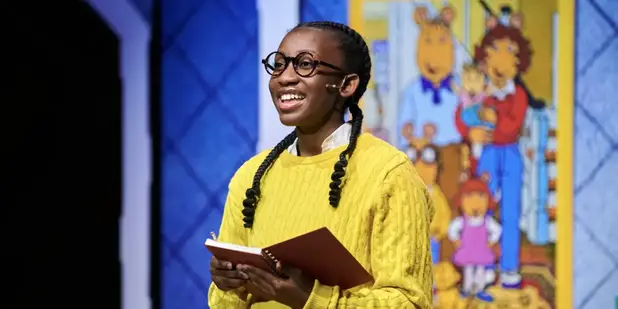
For an upbeat, kid-friendly show with heaps of heart, make a beeline for the world premier of Arthur & Friends Make a Musical at Milwaukee’s First Stage. When Mr. Ratburn’s class at Lakewood Elementary is asked to write and perform a show for all of Elwood City, the kids are super stoked. Except for Arthur, who’s struggling with what to contribute to the show. None of his ideas feel quite exciting enough. What’s an 8-year-old aardvark to do?
This First Stage musical is directed by Khalia Davis and features book and lyrics by John Maclay with music and lyrics by Brett Ryback, who also is the show’s musical director. Shoutout to Brett from a fellow Catholic Memorial High School alum. Brett was a senior when I was a freshman, and I fondly recall his sensational spin as Harold Hill in our production of The Music Man. How fun now to witness this charming, funny show of his firsthand at First Stage.
I had the pleasure of catching the Lakewood Cast, which features Sanaiah Hibbler as Arthur. Hibbler is a sophomore at Oak Creek High School and Arthur marks her fourth mainstage production at First Stage. She’s terrific and shines in moments both fast-paced and full of heart.
Supporting Hibbler is an entire cast of young performers that really brings it. This musical does a great job of giving everyone their own big, splashy musical number. It creates a veritable ensemble cast that, I imagine, would appeal to loads of young actors. Arthur gives each performer an opportunity to show loads of personality. Here’s who we get to enjoy in the Lakewood cast:
Fifth grader Layla Katers puts mighty spunk into her First Stage debut as Arthur’s little sister, D.W. Her obsession with aliens is a cute secondary story.
Niamh Mayne from PPMS sparkles as Muffy the fashionista, bringing flashy fun to “Dress for Success.”
Charlie Cornell, an eighth grader at St. Mary’s Visitation, stepped in from the other young performers cast as Brain. He’s perfectly poised and articulate, particularly during a wordy number where we’re nudged to “find a better word.” “Very is often overused,” Brain sings. This writer thoroughly enjoyed the playful reminder.
The musical theater fan in me found a standout favorite in Lucia Santana as Francine. Santana hails from Wisconsin Lutheran High School and brings genuine humor and originality to the 2022 version of Francine: an activist who believes that even when things are good, they can always be better. Her showstopper tells the story of Agent 355, a real-life female spy in the revolutionary war. Choreography by Khalia Davis impresses and amuses as the song dips into a Hamilton parody-a nod that had me laughing and loving it.
Alex Radke, a sophomore at Cedarburg High School, plays Arthur’s best friend Buster. He commands the stage during “Ulysses Napoleon Baggypants” alongside Baggypants himself, the hilarious Zach Thomas Woods.
Woods is one of three adult performers in the show, and Baggypants is a highlight of the Arthur. I also enjoyed Woods’ delivery of the winking line, “Are we solving problems through song?!”
SaraLynn Evenson as Arthur’s mother does indeed solve problems through song. She warmly reminds Arthur that he is “undeniable” and that it’s impossible to be boring when you’re the only one like you.
Rounding out the adult cast is the fizzy James Carrington as Mr. Ratburn. Carrington is a joy, delighting with laughs and big grins at every turn. All he has to do is enter the scene and voila! Smiles and giggles galore.
Arthur & Friends comes together with scenic design by Arnold Bueso, who has created a world lifted from the pages of Marc Brown’s books. Costume Designer Jason Orlenko nailed the looks for each character. We are invited to imagine Arthur as an aardvark, rather than the look being literal, and isn’t that perfect for children’s theater? A chance to tap into the power of imagination, as well as acknowledge the power there is in just being our authentic selves. Everyone is the star of their own story. Arthur & Friends is a marvelous reminder of that for kids and grown-ups alike.
Arthur & Friends Make a Musical is playing at First Stage through November 6, 2022. The show is approximately 75 minutes long, plus a brief intermission. It is recommended for families with children aged 5+. Find information and tickets at firstage.org.
Review by Kelsey Lawler for Broadway World.
Owen & Mzee, Directed by Tyrone Robinson, Debuts in NYC
Owen & Mzee The Musical is a inspiring true story of two great friends, a baby hippo named Owen and a 130-yr-old giant tortoise named Mzee. When Owen was stranded after a tsunami, villagers in Kenya worked tirelessly to rescue him. Then, to everyone’s amazement, the orphan hippo and the elderly tortoise adopted each other, and they became inseparable, swimming, eating, and playing together. Adorable photos e-mailed from friend to friend quickly made them worldwide celebrities. Here is a joyous reminder that in times of trouble, friendship is stronger than the differences that too often pull us apart.
Directed by Tyrone L. Robinson.
Audience
Appropriate for all ages.
Everyone must have a ticket regardless of age!
Running Time
60 minutes, with no intermission
Address
339 West 47th Street
Between 8th and 9th Avenue
New York NY, 10036
Get your ticket today for 11/14 or 11/21 !




